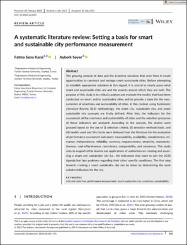A systematic literature review: Setting a basis for smart and sustainable city performance measurement
Künye
Karal, Fatma S. ve Soyer, A. (2023). A systematic literature review: Setting a basis for smart and sustainable city performance measurement. Sustainable Development, 32, 555-573.Özet
The growing amount of data and the inventive solutions that arise from it createopportunities to construct and manage smart sustainable cities. Before attemptingto establish appropriate solutions in this regard, it is crucial to clearly grasp whatsmart and sustainable cities are and the aspects around which they are built. Thepurpose of this study is to critically analyze and evaluate the studies that have beenconducted on smart and/or sustainable cities and to provide a basis for the mea-surement of smartness and sustainability of cities. In this context, using SystematicLiterature Review (SLR) methodology, the smart city, sustainable city, and smartsustainable city concepts are firstly defined. After that, the indicators for theassessment of the smartness and sustainability of cities and the selection processesof these indicators are analyzed. According to the analysis, the studies weregrouped based on the use of (i) selection criteria, (ii) selection methods/tools, and(iii) models used and 14 criteria were deduced from the literature for the evaluationof performance assessment indicators: measurability, availability, completeness, rel-evance, independence, reliability, currency, responsiveness, simplicity, representa-tiveness, cost-effectiveness, consistency, comparability, and consensus. This studyaims to support other studies and applications of authorities on creating and asses-sing a smart and sustainable city (i.e., the indicators) that want to join the 2030Agenda but face problems regarding their cities' specific conditions. The first steptowards creating a smart sustainable city can be taken by determining the mostsuitable indicators for the city.

















